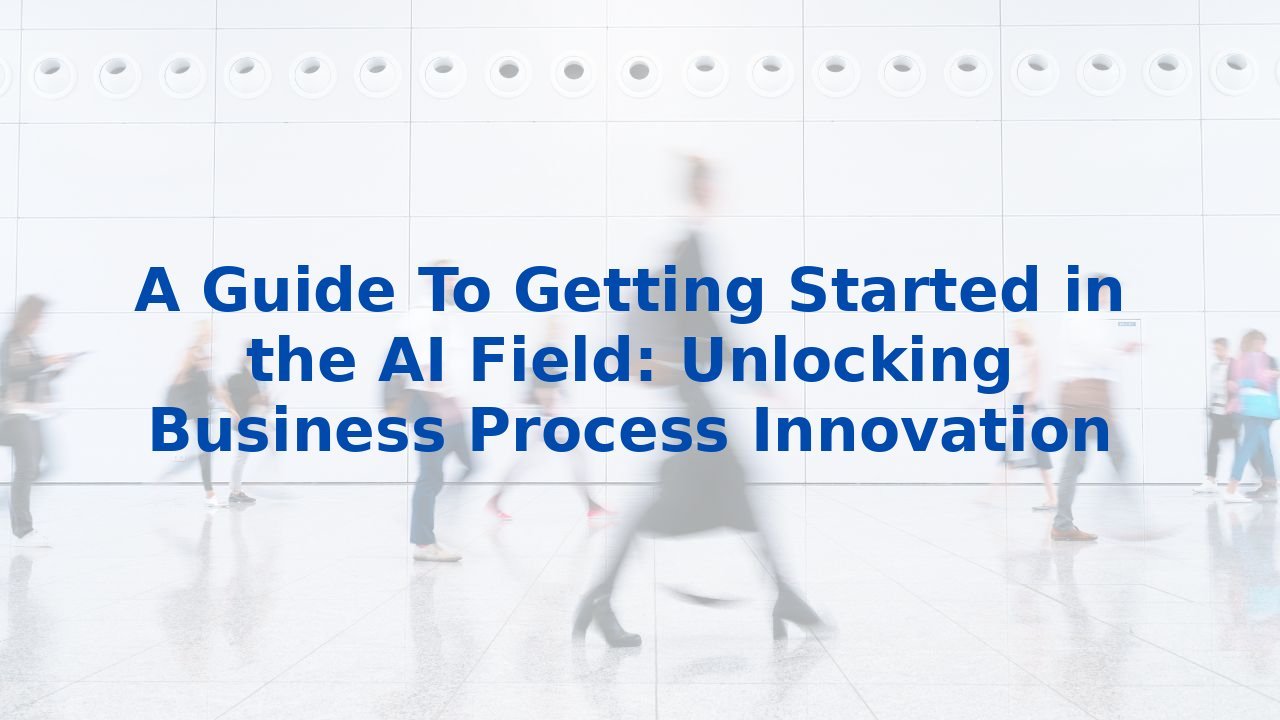A Guide To Getting Started in the AI Field: Unlocking Business Process Innovation
A Guide To Getting Started in the AI Field: Unlocking Business Process Innovation
Artificial Intelligence (AI) is not just a trend; it’s a paradigm shift that has the power to transform how businesses operate. Understanding its potential can unlock new efficiencies while driving significant innovation in the realm of business processes. Let’s dive into how you can harness the capabilities of AI to elevate your organization's operational excellence.
The Role of AI in Enhancing Business Processes
The journey of integrating AI into business processes begins with understanding its pivotal role in enhancing various operational layers. Let’s explore these layers further:
1. Process Discovery: Unveiling Hidden Efficiencies
The foundation for AI's impact lies in process discovery, where AI algorithms sift through vast sets of operational data. This phase addresses inefficiencies that might elude routine human observation. By employing techniques like process mining and natural language processing, businesses can uncover workflows that need refinement. These insights are invaluable for identifying immediate opportunities for improvement and setting the stage for subsequent optimizations.
2. Process Mapping: Creating a Blueprint for Success
Once inefficiencies are uncovered, the focus shifts to process mapping. AI tools can visualize these workflows, highlighting interconnections and vulnerabilities. This approach not only keeps process documentation fresh but also allows for customization to meet specific organizational requirements. Think of AI-generated process maps as a dynamic blueprint guiding your strategic decisions and helping your teams work more cohesively.
3. Process Automation: Streamlining Operations
One of the most compelling capabilities of AI is process automation. By deploying software bots, mundane, repetitive tasks can be handled swiftly, allowing your teams to redirect their energy toward higher-value activities. Imagine automating tedious processes like onboarding or invoice management—tasks that traditionally consume precious human resources. This shift not only bolsters productivity but also enhances employee satisfaction as teams engage in more meaningful work.
4. Process Management: Continuous Monitoring and Improvement
With AI’s capabilities, continuous monitoring of business processes is now within reach. Advanced monitoring tools can analyze key performance indicators (KPIs) in real time, mitigating potential issues before they escalate. This proactive approach fosters responsive decision-making and reinforces a culture of efficiency. In a world where information flows incessantly, staying ahead of the curve is not just advantageous but essential.
5. Process Improvement: Data-Driven Insights
AI stands as a beacon of data-driven insights, providing businesses with predictive models and root cause analyses that unveil actionable improvements. By diligently analyzing historical data, AI can anticipate bottlenecks and simulate various scenarios, allowing you to adapt to changing conditions proactively. This dynamic adaptability theme cannot be overstated; it ensures that businesses remain agile and resilient in the face of market evolution.
Benefits of AI in Business Processes
The integration of AI into your operations doesn't just streamline processes; it revolutionizes them. Consider these core benefits:
- Enhanced Efficiency: Automation reduces both manual intervention and error risks, driving operational efficiency.
- Improved Decision-Making: Data-driven insights empower organizations to make informed choices.
- Increased Productivity: By automating routine tasks, your teams can focus on strategic initiatives.
- Real-Time Monitoring: Immediate alerts to performance deviations foster quick interventions.
- Cost Reduction: Streamlining operations leads to significant cost savings through reduced labor demands.
The Importance of Training Employees for AI
To truly realize the potential of AI, workforce training is paramount. Here are a few pivotal reasons:
- Understanding AI Tools: Employees must grasp how these tools function and integrate into existing workflows.
- Data Analysis Skills: With AI generating rich data, teams need the aptitude to interpret this information effectively.
- Adaptability: The ability to embrace and adapt to new technologies is critical in this swiftly evolving landscape.
- Collaboration: By fostering collaboration between human insight and AI systems, organizations can elevate performance.
Training your employees not only equips them with essential skills but also nurtures a culture where innovation thrives as AI becomes a strategic partner in everyday operations.
Conclusion
The transformative power of AI in modern business processes is undeniable. As organizations look toward the future, integrating AI allows for enhanced discovery, mapping, automation, management, and continual improvement of processes. Investing in AI not only paves the way for operational efficiency but also enables organizations to cultivate a proactive, skilled workforce positioned for tomorrow’s challenges. Embracing this change fully can be the difference between leading the pack and merely keeping pace in an ever-competitive landscape. Ready to take the plunge into AI? Let the journey begin.



